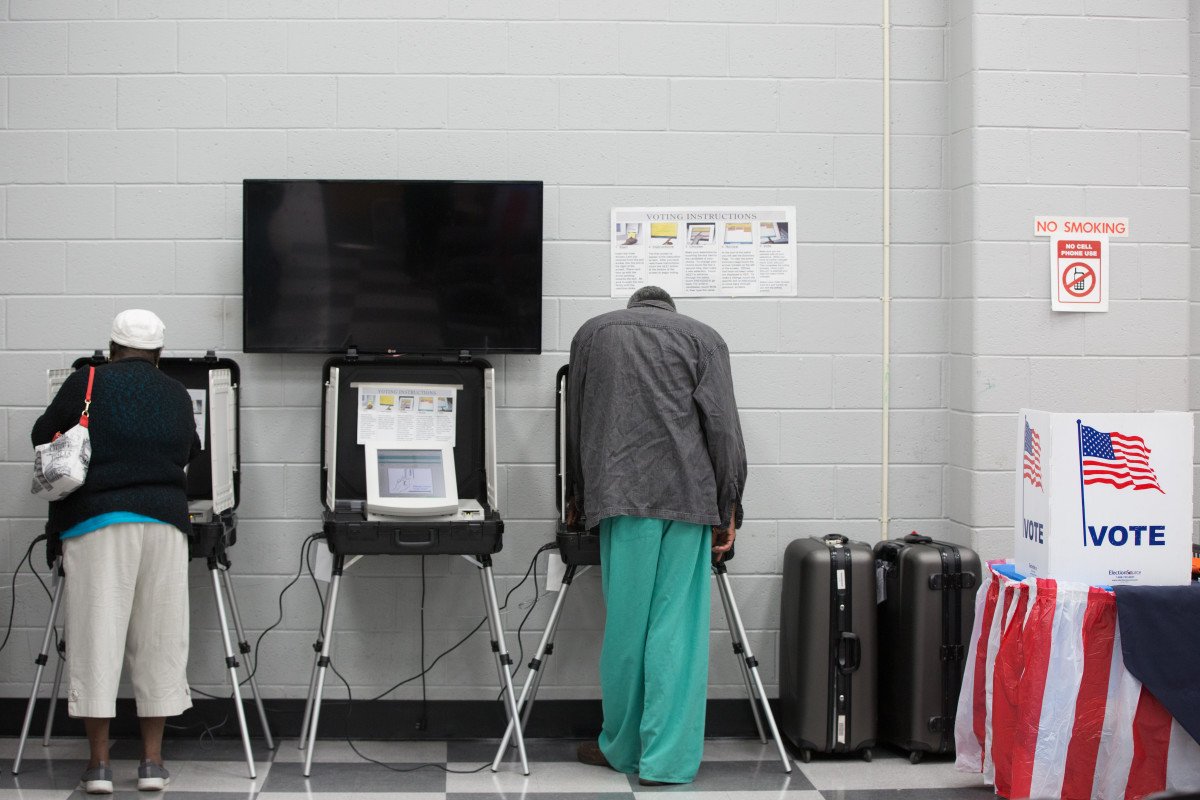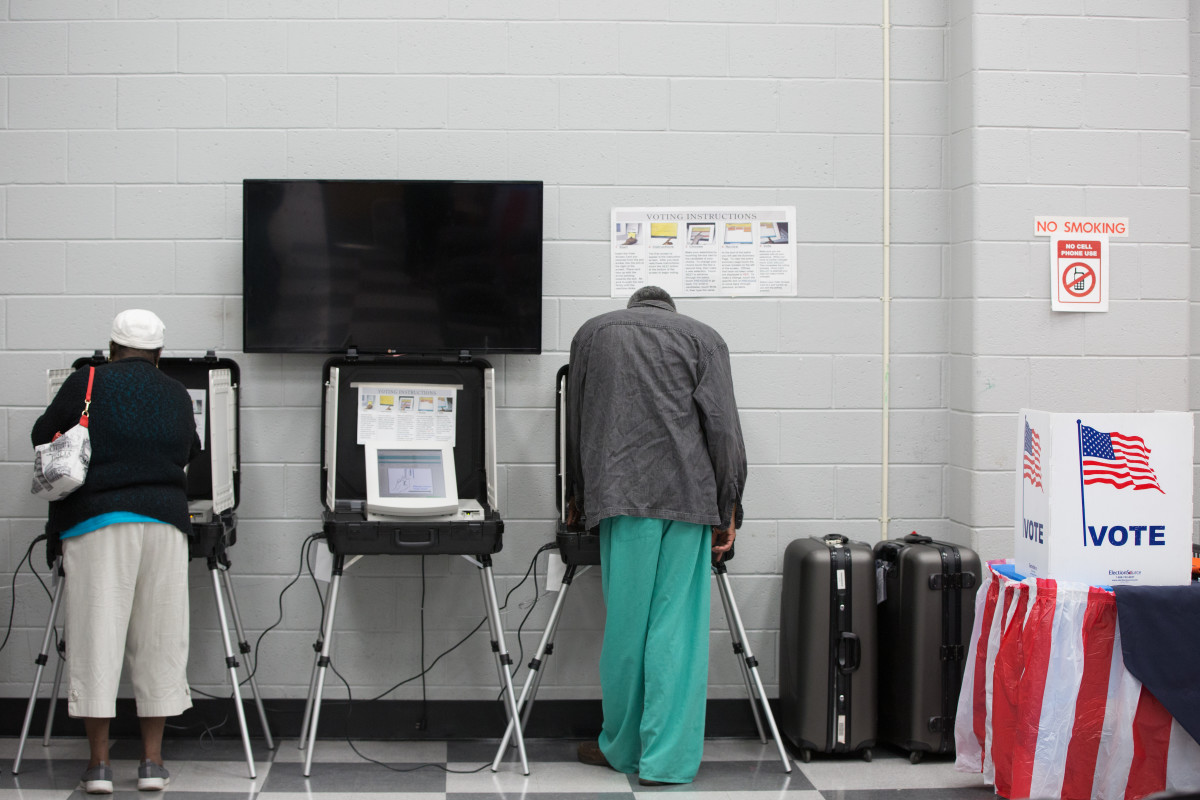99-year-old Mississippi man born on a plantation votes in election | ABC News
“I remember when I couldn’t vote,” Dr. Robert H. Smith Sr. said.
A 99-year-old man who was born the son of a sharecropper on a plantation is making sure his voice is being heard in this year’s election – and sending an important reminder of just how crucial it is to exercise your right to vote.
Dr. Robert H. Smith Sr., of Jackson, Mississippi, submitted an absentee ballot while wearing a face mask and proudly sporting his “I Voted” sticker.
“I remember when I couldn’t vote,” Smith told ABC News.
— Credits
Featured Image, Rhonda Smith
FULL ARTICLE @ ABC NEWS
— Related
The Civil Rights Act of 1866 (14 Stat. 27–30, enacted April 9, 1866, but not ratified until 1870) was the first United States federal law to define citizenship and affirm that all citizens are equally protected by the law. It was mainly intended, in the wake of the American Civil War, to protect the civil rights of persons of African descent born in or brought to the United States.
The Act was passed by Congress in 1865 and vetoed by United States President Andrew Johnson. In April 1866 Congress again passed the bill to support the Thirteenth Amendment, and Johnson again vetoed it, but a two-thirds majority in each chamber overrode the veto to allow it to become law without presidential signature.
— Source – Civil Rights Act of 1866 (Updated: 16 October 2020) Wikipedia. Available at https://en.wikipedia.org/wiki/Civil_Rights_Act_of_1866, (Accessed: 30 October 2020)
The Enforcement Act of 1871 (17 Stat. 13), also known as the Civil Rights Act of 1871, Force Act of 1871, Ku Klux Klan Act, Third Enforcement Act, or Third Ku Klux Klan Act, is an Act of the United States Congress which empowered the President to suspend the writ of habeas corpus to combat the Ku Klux Klan (KKK) and other white supremacy organizations. The act was passed by the 42nd United States Congress and signed into law by United States President Ulysses S. Grant on April 20, 1871. The act was the last of three Enforcement Acts passed by the United States Congress from 1870 to 1871 during the Reconstruction Era to combat attacks upon the suffrage rights of African Americans. The statute has been subject to only minor changes since then, but has been the subject of voluminous interpretation by courts.
This legislation was asked for by President Grant and passed within one month of when the president sent the request to Congress. Grant’s request was a result of the reports he was receiving of widespread racial threats in the Deep South, particularly in South Carolina. He felt that he needed to have his authority broadened before he could effectively intervene. After the act’s passage, the president had the power for the first time to both suppress state disorders on his own initiative and to suspend the right of habeas corpus. Grant did not hesitate to use this authority on numerous occasions during his presidency, and as a result the first era KKK was completely dismantled and did not resurface in any meaningful way until the first part of the 20th century. Several of its provisions still exist today as codified statutes. The most important of these is 42 U.S.C. § 1983
— Source – Third Enforcement Act (Updated: 01 October 2020) Wikipedia. Available at https://en.wikipedia.org/wiki/Third_Enforcement_Act, (Accessed: 30 October 2020)
The Enforcement Act of 1871 (17 Stat. 13), also known as the Civil Rights Act of 1871, Force Act of 1871, Ku Klux Klan Act, Third Enforcement Act, or Third Ku Klux Klan Act, is an Act of the United States Congress which empowered the President to suspend the writ of habeas corpus to combat the Ku Klux Klan (KKK) and other white supremacy organizations. The act was passed by the 42nd United States Congress and signed into law by United States President Ulysses S. Grant on April 20, 1871. The act was the last of three Enforcement Acts passed by the United States Congress from 1870 to 1871 during the Reconstruction Era to combat attacks upon the suffrage rights of African Americans. The statute has been subject to only minor changes since then, but has been the subject of voluminous interpretation by courts.
This legislation was asked for by President Grant and passed within one month of when the president sent the request to Congress. Grant’s request was a result of the reports he was receiving of widespread racial threats in the Deep South, particularly in South Carolina. He felt that he needed to have his authority broadened before he could effectively intervene. After the act’s passage, the president had the power for the first time to both suppress state disorders on his own initiative and to suspend the right of habeas corpus. Grant did not hesitate to use this authority on numerous occasions during his presidency, and as a result the first era KKK was completely dismantled and did not resurface in any meaningful way until the first part of the 20th century. Several of its provisions still exist today as codified statutes. The most important of these is 42 U.S.C. § 1983
— Source – Civil Rights Act of 1875 (Updated: 01 October 2020) Wikipedia. Available at https://en.wikipedia.org/wiki/Civil_Rights_Act_of_1875, (Accessed: 30 October 2020)
The Civil Rights Act of 1964 (Pub.L. 88–352, 78 Stat. 241, enacted July 2, 1964) is a landmark civil rights and labor law in the United States that outlaws discrimination based on race, color, religion, sex, national origin, and later sexual orientation. It prohibits unequal application of voter registration requirements, racial segregation in schools and public accommodations, and employment discrimination.
Initially, powers given to enforce the act were weak, but these were supplemented during later years. Congress asserted its authority to legislate under several different parts of the United States Constitution, principally its power to regulate interstate commerce under Article One (section 8), its duty to guarantee all citizens equal protection of the laws under the Fourteenth Amendment, and its duty to protect voting rights under the Fifteenth Amendment.
The legislation had been proposed by President John F. Kennedy in June 1963, but it was opposed by filibuster in the Senate. After Kennedy was assassinated on November 22, 1963, President Lyndon B. Johnson pushed the bill forward. The United States House of Representatives passed the bill on February 10, 1964, and after a 54-day filibuster, it passed the United States Senate on June 19, 1964. The final vote was 290–130 in the House of Representatives and 73–27 in the Senate. After the House agreed to a subsequent Senate amendment, the Civil Rights Act was signed into law by President Johnson at the White House on July 2, 1964.
— Source – Civil Rights Act of 1964 (Updated: 25 October 2020) Wikipedia. Available at https://en.wikipedia.org/wiki/Civil_Rights_Act_of_1964, (Accessed: 30 October 2020)
The Civil Rights Act of 1968 (Pub.L. 90–284, 82 Stat. 73, enacted April 11, 1968) is a landmark law in the United States signed into law by United States President Lyndon B. Johnson during the King assassination riots.
The Indian Civil Rights Act applies to the Native Americans who suffered discrimination during the turbulent 1960s. (that Act appears today in Title 25, sections 1301 to 1303 of the United States Code).
Titles VIII through IX are commonly known as the Fair Housing Act (FHA), which was meant as a follow‑up to the Civil Rights Act of 1964 (this is different legislation than the Housing and Urban Development Act of 1968, which expanded housing funding programs). While the Civil Rights Act of 1866 prohibited discrimination in housing, there were no federal enforcement provisions. The 1968 act expanded on previous acts and prohibited discrimination concerning the sale, rental, and financing of housing based on race, religion, national origin, and since 1974, sex. Since 1988, the act protects people with disabilities and families with children. Pregnant women are also protected from illegal discrimination because they have been given familial status with their unborn child being the other family member. Victims of discrimination may use both the 1968 act and the 1866 act’s section 1983 to seek redress. The 1968 act provides for federal solutions while the 1866 act provides for private solutions (i.e., civil suits). The act also made it a federal crime to “by force or by threat of force, injure, intimidate, or interfere with anyone… by reason of their race, color, religion, or national origin, handicap or familial status.”
Title X, commonly known as the Anti-Riot Act, makes it a felony to “travel in interstate commerce…with the intent to incite, promote, encourage, participate in and carry on a riot.” That provision has been criticized for “equating organized political protest with organized violence.”
Source – Civil Rights Act of 1968 (Updated: 26 October 2020) Wikipedia. Available at https://en.wikipedia.org/wiki/Civil_Rights_Act_of_1968, (Accessed: 30 October 2020)
Published at Tue, 03 Nov 2020 12:04:22 +0000


